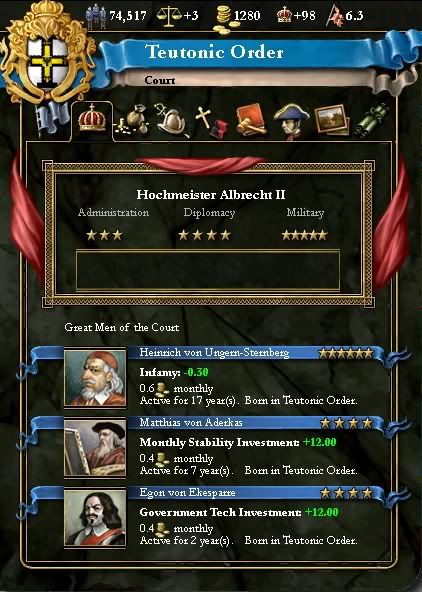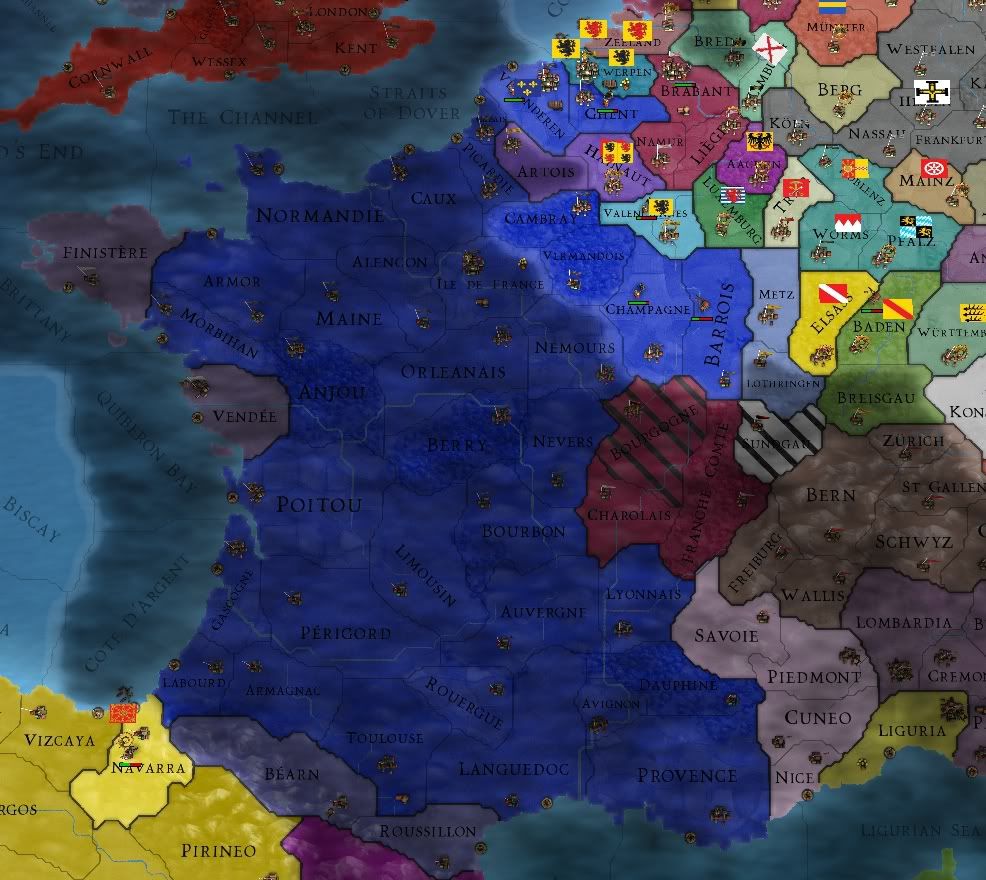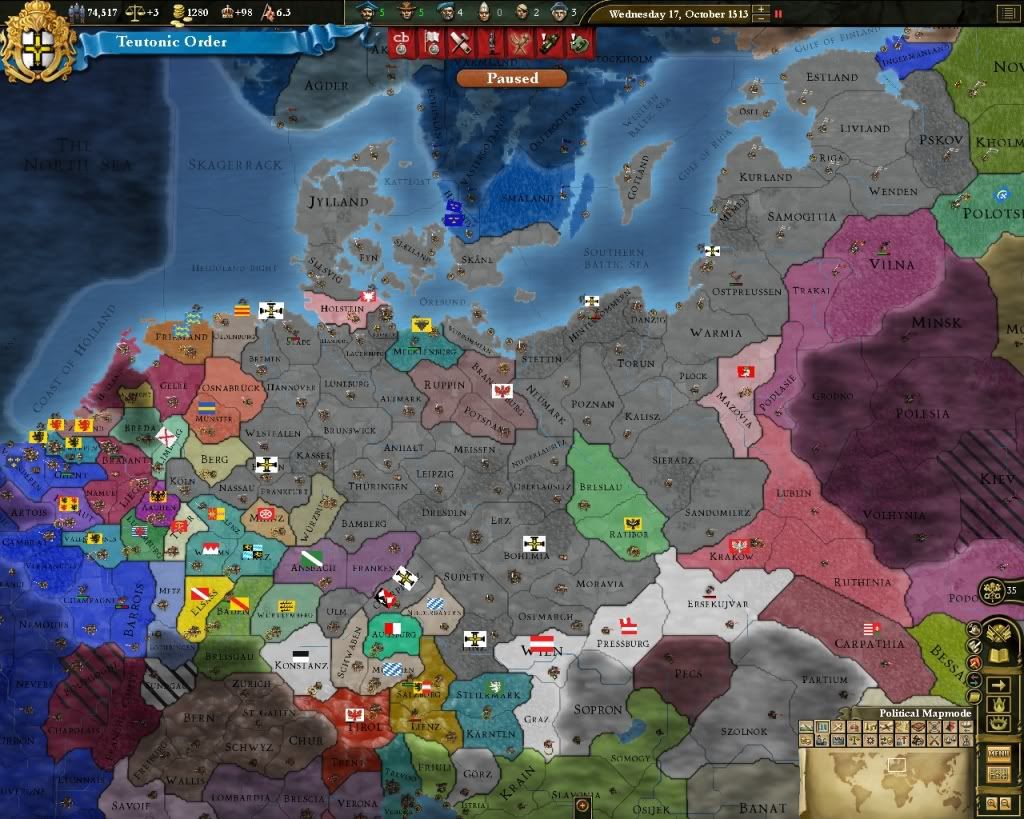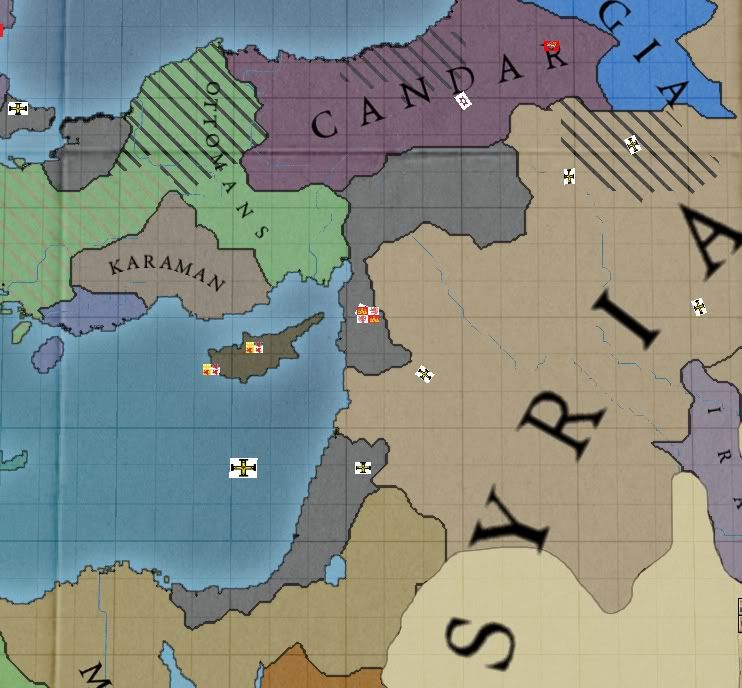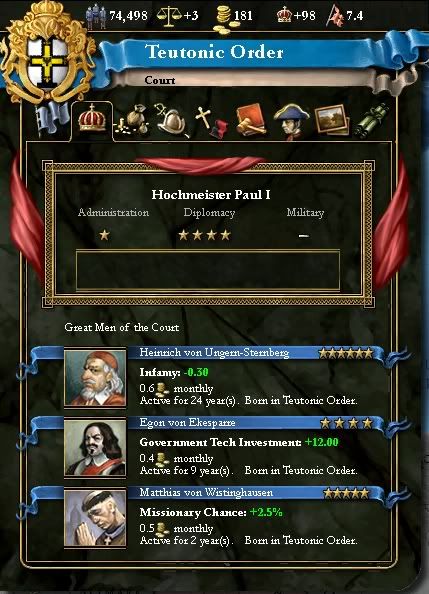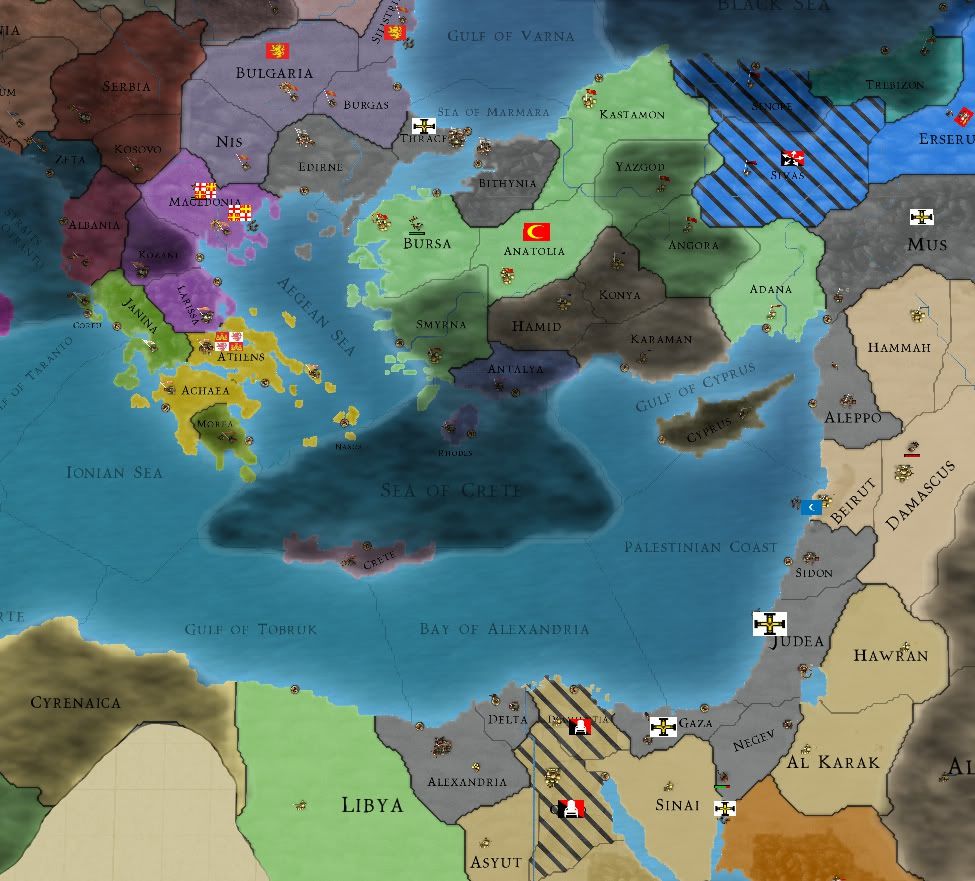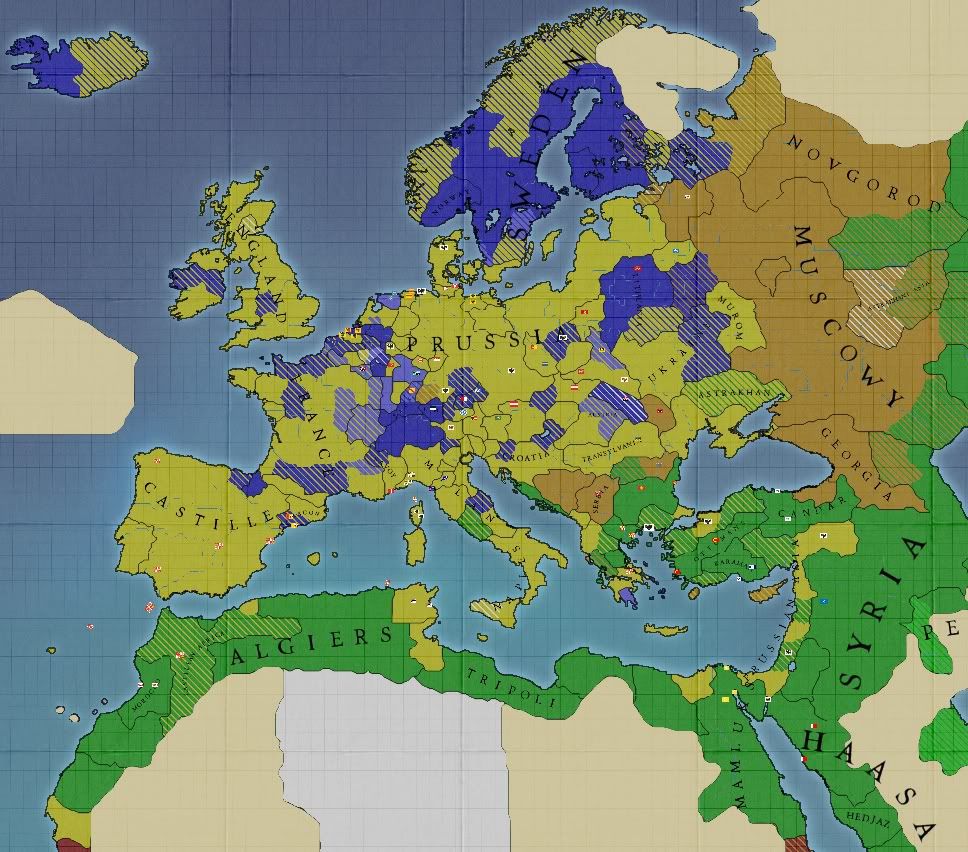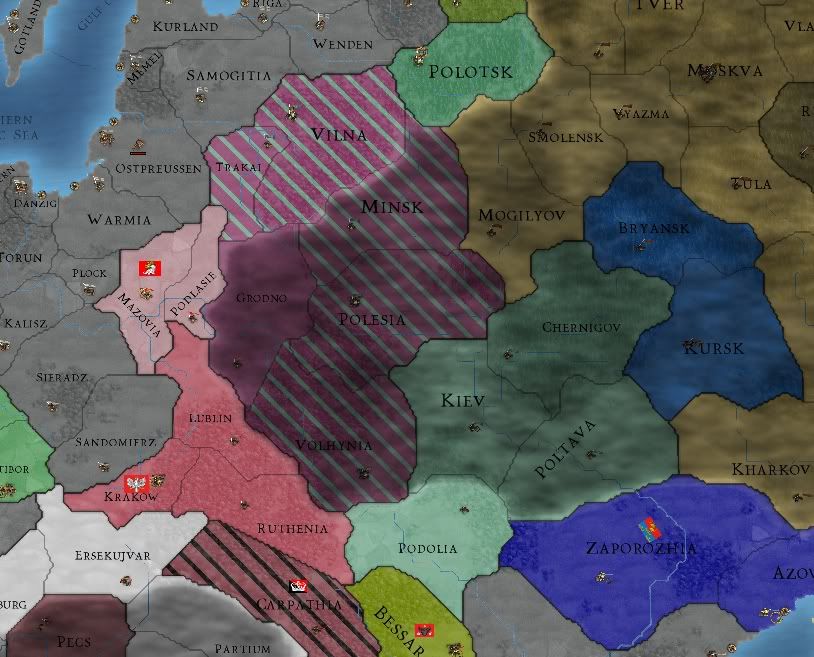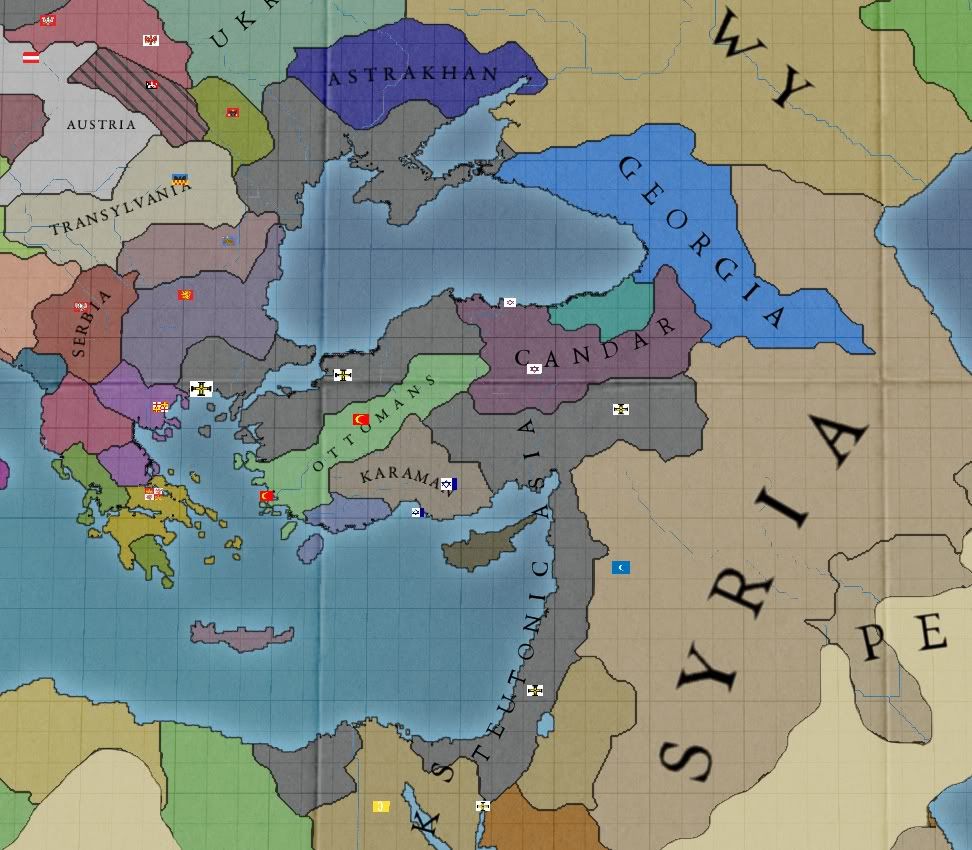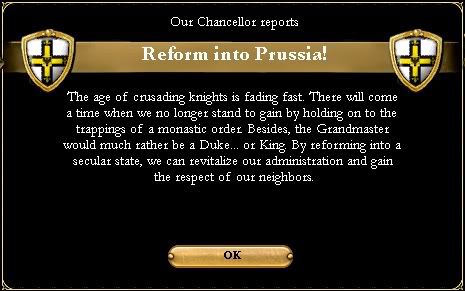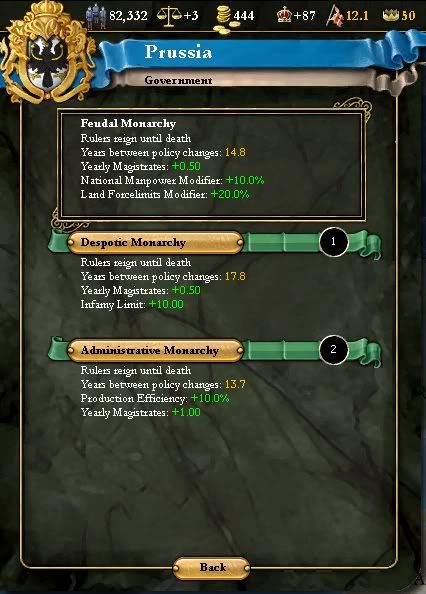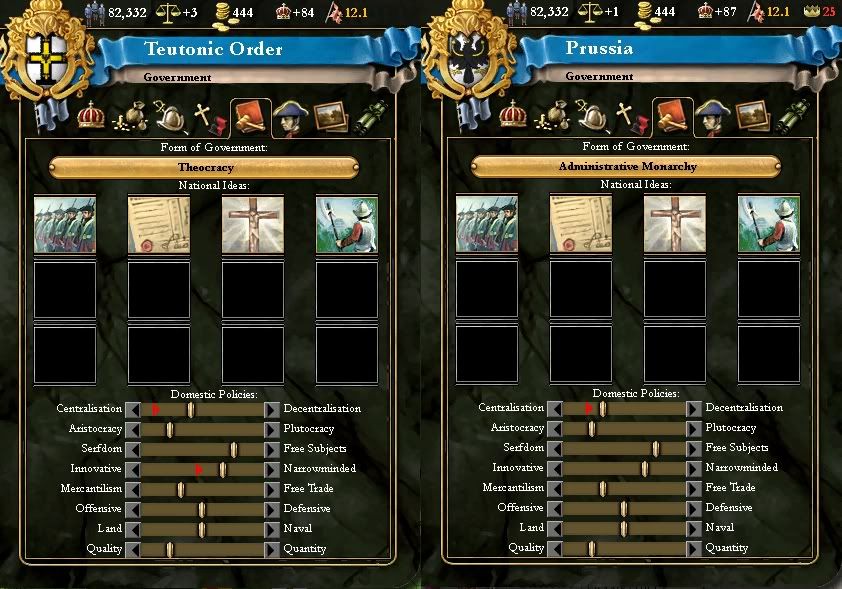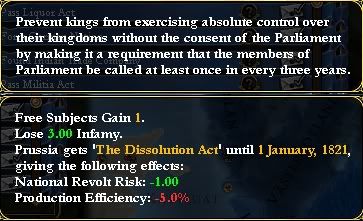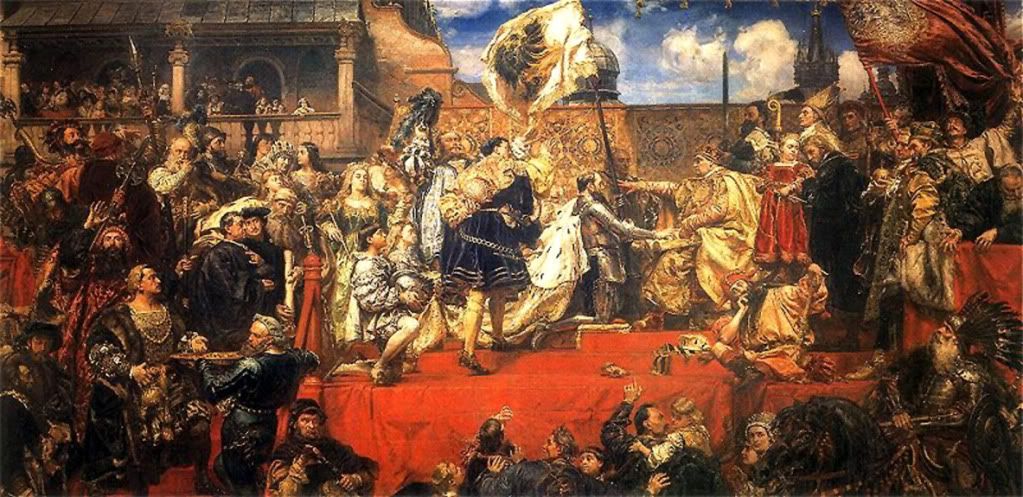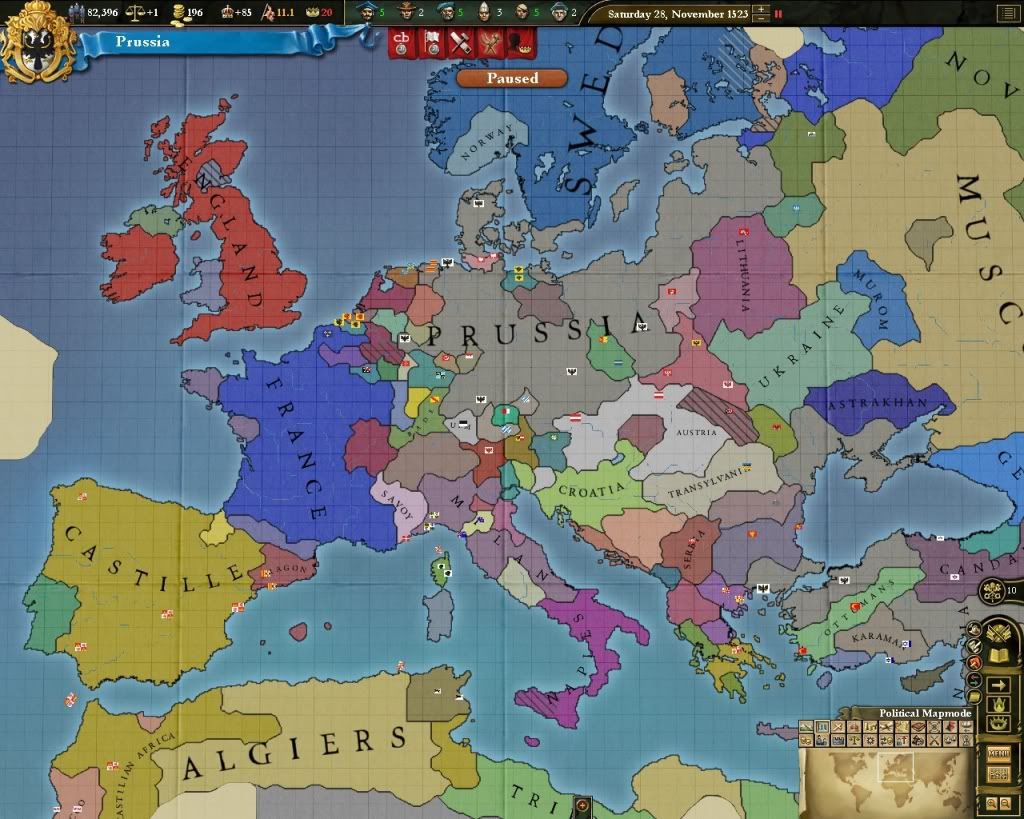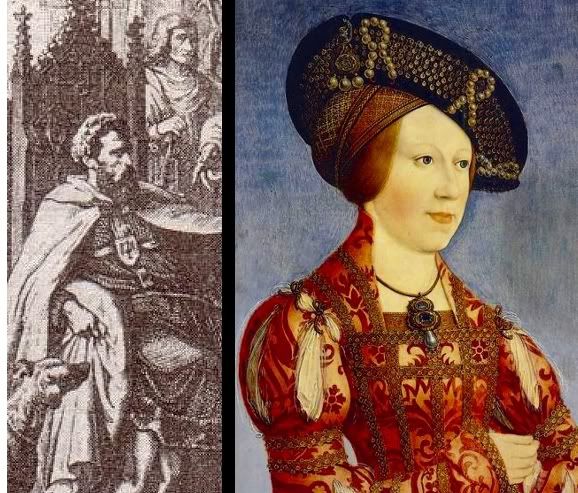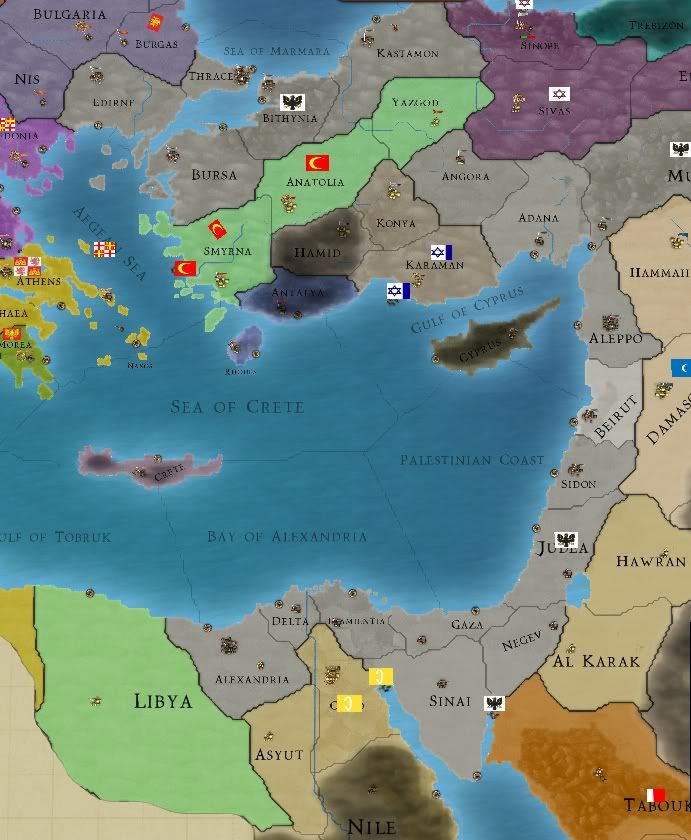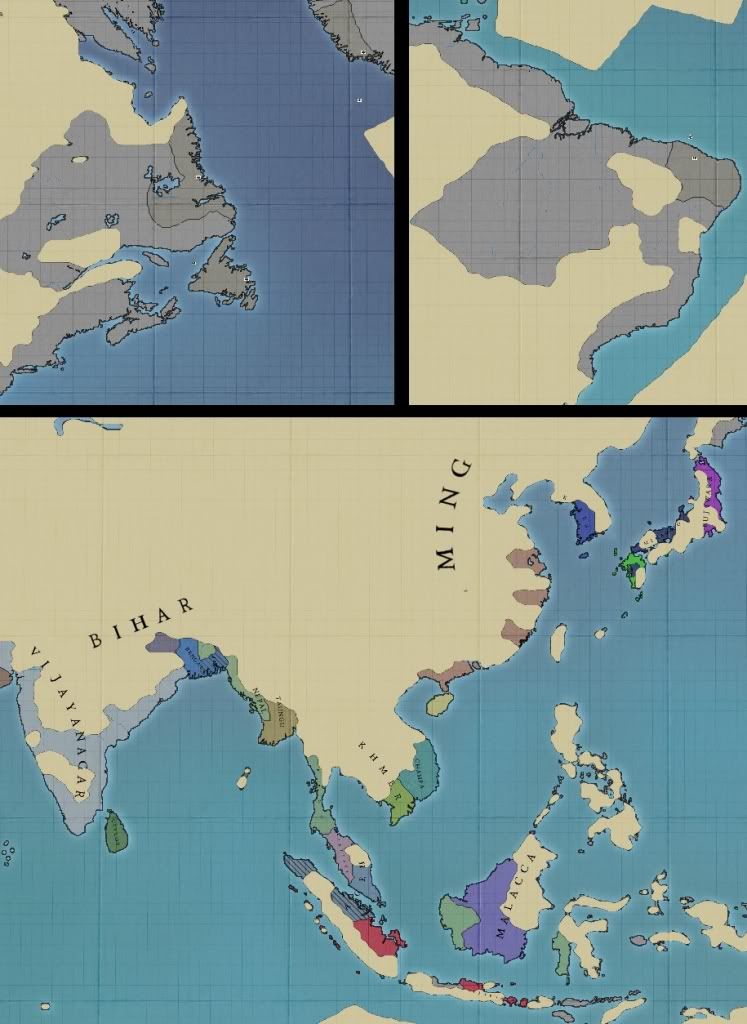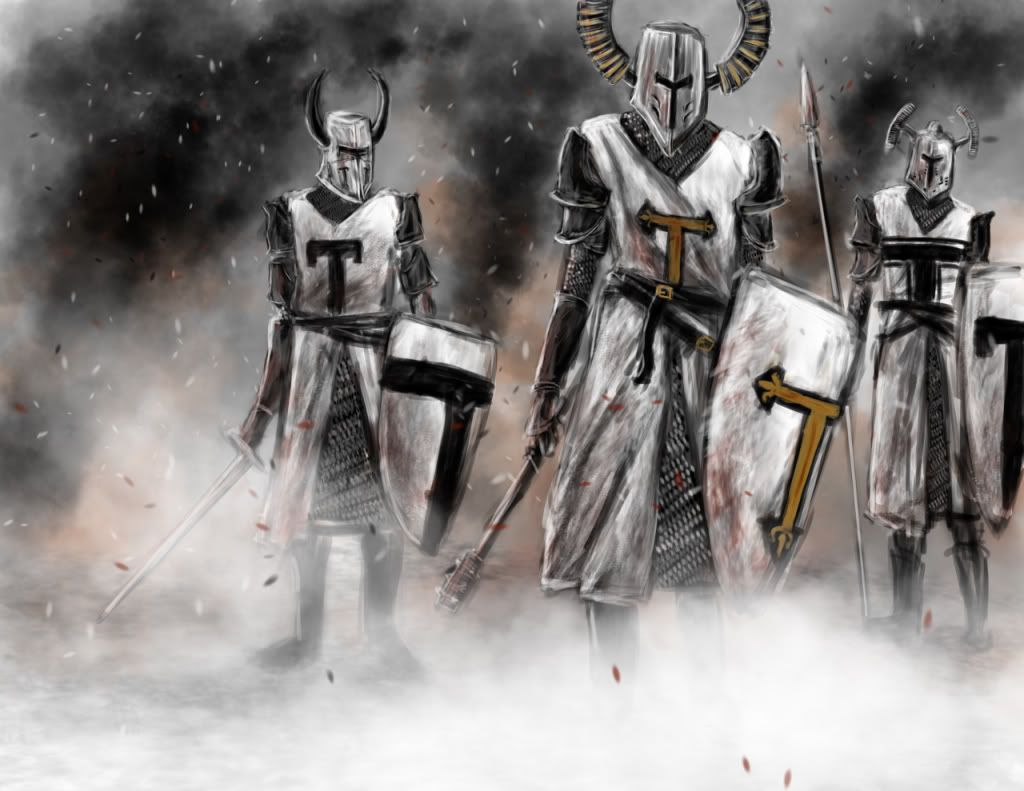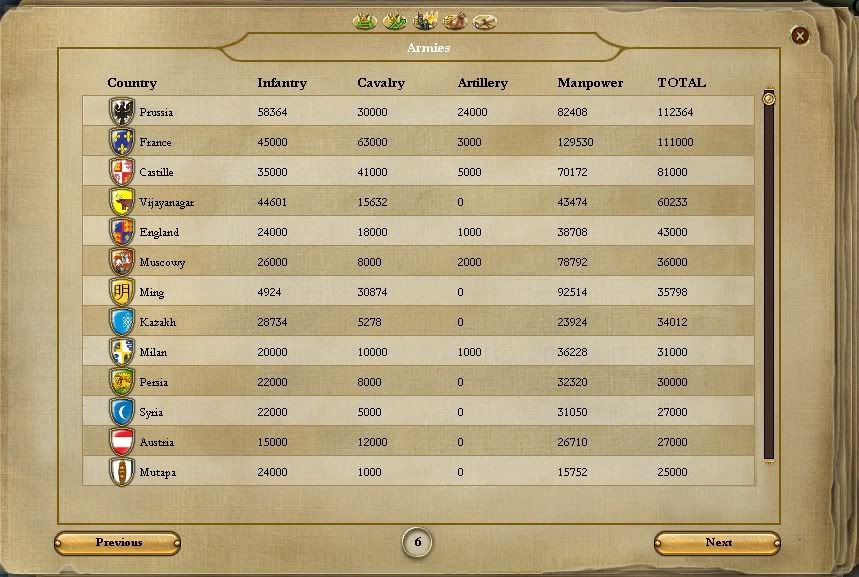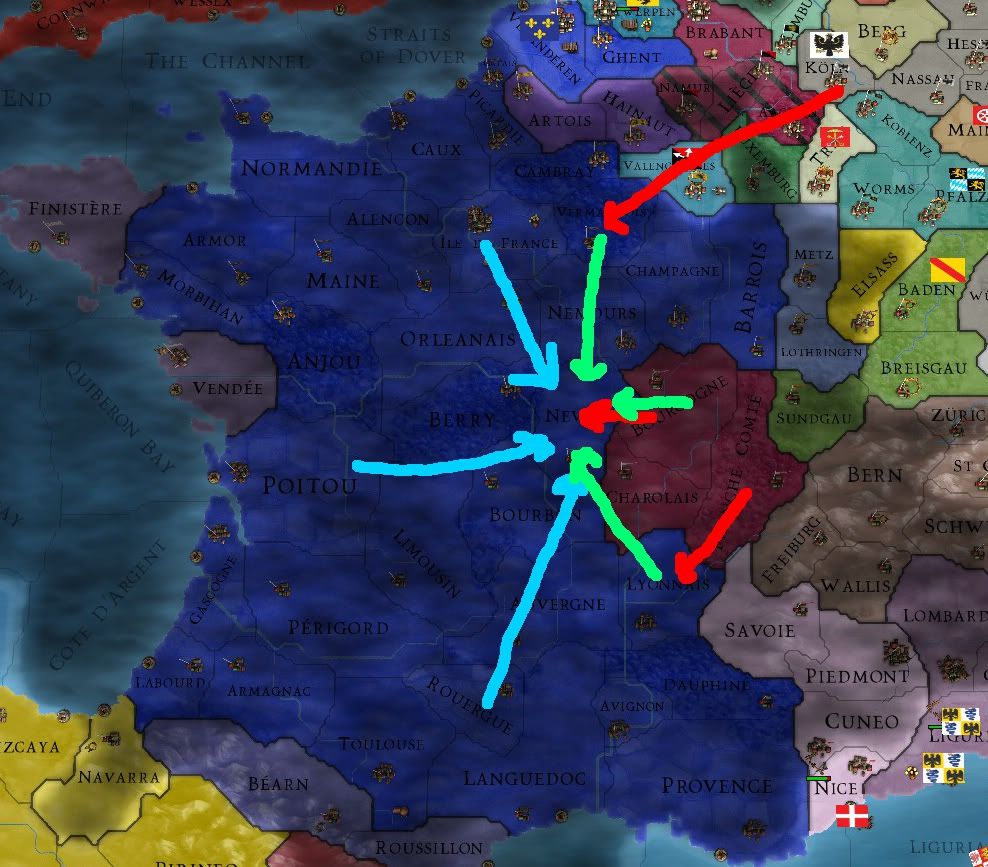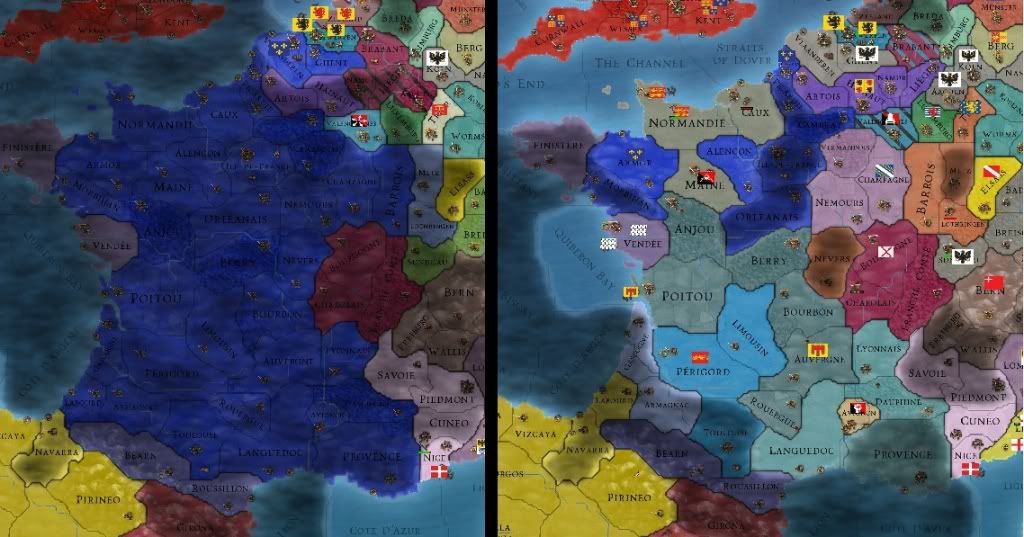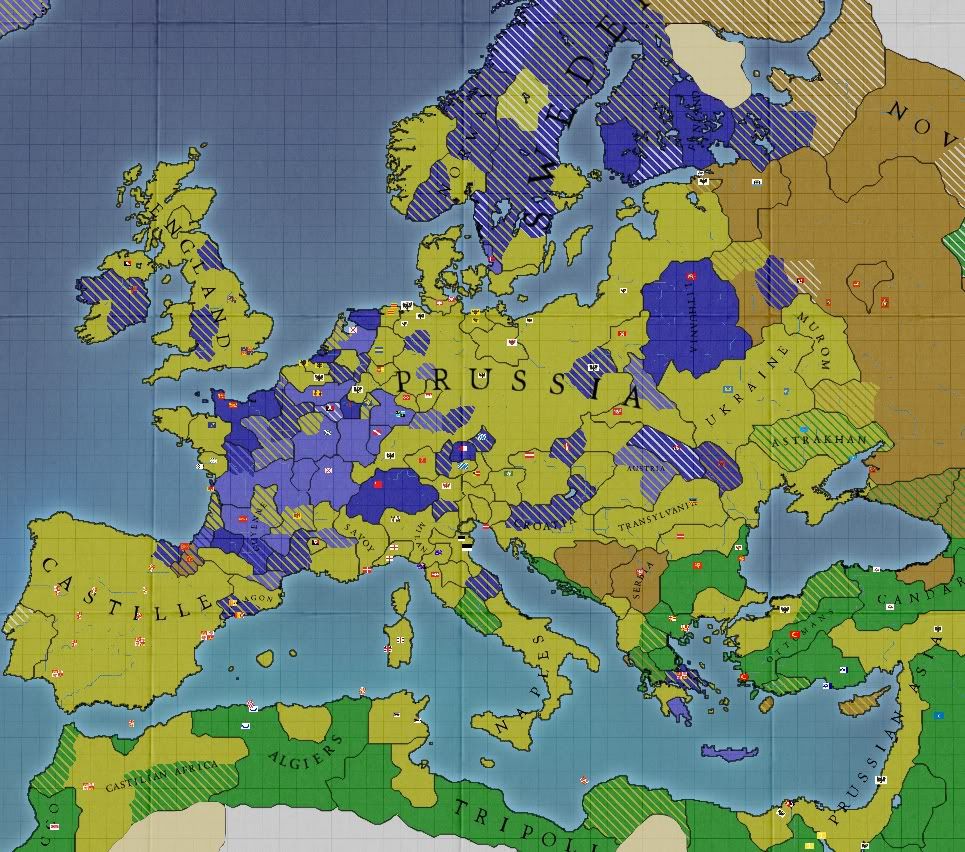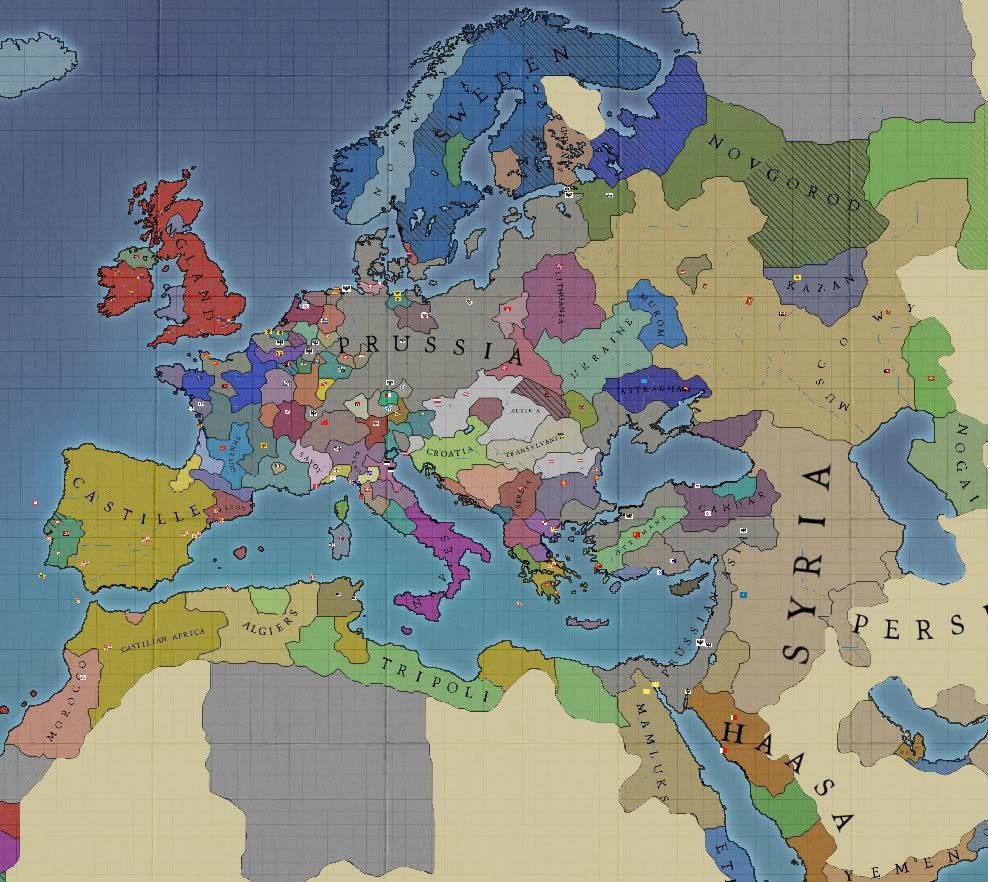The Iron Cross Triumphant
St. Albrecht II the Great 1498 – 1519
Among the final Hochmesiters of the Teutonic Order none are as revered or as well known as Albrecht II, who is undoubtedly one of greatest leaders the Teutonic Order has ever known. While some modern historians argue that his accomplishments were due more to the hard work of his predecessors than his personal brilliance, the historical records clearly indicate that this was not the case. While Albrecht did inherit a state stronger than ever before, his enemies were also stronger and more numerous than ever. A thorough examination of the great struggles he encountered shows that his stunning victories were not at all inevitable. A lesser, more timid ruler would have faltered where he boldly pressed ahead to some of the Order’s greatest triumphs.
Albrecht II was born in Konigsberg and was the closest legitimate relative of both Albrecht I (his mother’s uncle) and Walter I (his father’s great-uncle). With this impeccable lineage, powerful family connections, and natural aptitude in military, diplomatic, and administrative matters he rose swiftly in the ranks of the Order. After the passing of Clemens August he gained the votes needed to be elected Hochmeister in 1499. Like his predecessors, he had two simple goals for the Ordenstadt; expand its influence amongst the German states at the expense of the Holy Roman Empire and push back the Muslims.
Albrecht II and his closest advisors
The First Decade
Albrecht II’s first decade of rule was rather typical for the Teutonic Order, but even then he was preparing the groundwork for his future conquests. After three years of peace he began his first war against the Emperor over the excommunicated duke of Frankfurt. Austria was joined by Styria and England but was battered by a recent war with the French. Brandenburg remained neutral as they had recently left their long personal union under England. With clear land and naval superiority, the war only lasted a year with excellent results. Frankfurt and Ostmarch were annexed, Styria vassalized, and England forced to abandon all claim to Whales (released in the previous Teutonic-English war).
The following years were mostly quiet for the order, besides the occasional revolt in the Eastern provinces. Hesse was diplomatically annexed into the Ordenstadt, and zealous missionaries finally quelled the last remnants of Islam in the former Ottoman Lands. In 1504 Albrecht II laid claim to the Venetian province of Budjak, for its strategic position between Crimea and Constantinople. A quick, relatively bloodless war forced Venice to cede Budjak, ending their presence in the Black Sea. Later in 1505 Albrecht declared war against Augsberg which refused to recognize his authority. This time, the Emperor refrained from intervening, leaving Augsberg defended by only Brandenburg and Switzerland. Victory in Augsberg and Brandenburg was swift and decisive, but the Swiss ran a brilliant defensive campaign in the Alps and badly mauled two Teutonic armies. Seeing little point in further conflict, Albrecht made a white peace with the Swiss, but forced Augsberg and more importantly Brandenburg to become Teutonic vassals. At long last, the irritating hole in the center of the Ordenstadt was filled and Northern Germany completely united under the Iron Cross.
Albrecht’s most prominent and lasting diplomatic contribution was the signing of an alliance with Castile. Teutonic-Castilian relations had been warm since their cooperation during the Great Crusade against the Ottomans, and the two leaders felt that a formal alliance would aid them both in future crusades and against the increasingly belligerent France. Unlike many alliances of that period the Spanish-Teutonic alliance would last for generations and dramatically shape future Teutonic policy. Immediately after the alliance was signed, the nations embarked on a joint crusade against the reborn Muslim Byzantine Empire which had claimed much of Greece during their rebellion against the Ottomans. The Byzantines had no defense against the two giants, and quickly ceded Adrianople to the Ordenstadt and Achaea and Athens to the Spanish.
Unchecked French expansion was a concern to both Castile and the Order
Gameplay Notes:
- After 50 FREAKING YEARS Brandenburg is finally out of its PU with England. I snapped them up ASAP. We haven’t seen the last of the English and their PU’s though…
- Castile makes a great ally. Their border with France and powerful navy will be very useful in the long term. I don’t mind them poking around into Africa and Greece, they’re welcome to those basket cases.
The Beginning of the End
For a hundred years, the Holy Roman Empire as an institution had been in a steady decline. A string of Teutonic expansions into Imperial lands, the fall of Rome and the subsequent Teutonic response, and the recent expansion of the French had seriously weakened the Emperor’s authority and military might. The imperial states were now looking to themselves or their stronger neighbors for protection instead of the Emperor. Internationally, the only major power that still recognized the Emperor’s “authority” was England, which was closely tied to the Austrian Emperor with treaties and marriages. The Pope was hostile to the Emperor, partly from his Teutonic background and partly from the lack of Imperial response to the Muslim occupation of Rome. Most importantly, with the vassalization of Brandenburg and Styria, all the electors save the Bishop of Cologne swore fealty to the Hochmeister. There had been many wars with the Emperor in the past, but the stage was now set such that an overwhelming Teutonic victory could determine the Empire’s very existence.
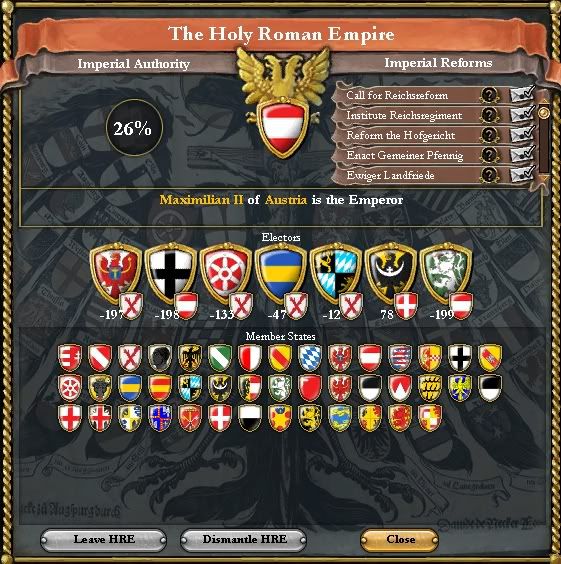
The Holy Roman Empire prior to the war. Only Cologne is independant
The Grapple
Teutonic-Imperial hostilities resumed in 1508, this time over the small state of Klon. The Emperor had spent his years of peace well and had assembled a coalition of Lorraine, Burgundy, and Bavaria to face the Order. Arrayed against them were the Order itself, Castile (which would offer only minimal support), and the legion of Teutonic vassals in Northern Germany. Not counting Castile the two factions were roughly equal in strength. With most of the empire arrayed against the Order Albrecht sensed that this would be no ordinary war. The Ordenstadt faced its greatest threat in three generations, but also had an opportunity to end its constant warfare with the empire through total victory.
At the commencement of hostilities, the Teutonic armies were badly positioned to deal with Burgundy. Only a single army of 24,000 was stationed in the North with the rest (some 70,000 men) arrayed against Austria and Bavaria. An army was immediately diverted north to deal with the Burgundians, but this left the forces arrayed against Austria without numerical superiority. Disaster struck soon after. Based on past experiences, Albrecht had assumed that the Burgundians would be easily defeated by his 40,000 men, and initial victories in Cologne over the local garrisons reinforced this attitude. He was soon proven false. Albrecht’s reinforcing army of 16,000 men was caught off guard at Limburg by an army of 20,000 Burgundians and badly defeated, losing 6,500 men. Worse yet, Walter von Wattzau’s army of 24,000 was attacked in Holland by a massive army of 40,000 Burgundians. Albrecht realized that he had woefully underestimated Burgundy’s strength, and ordered a general retreat back to the Ordenstadt and commissioned a new army of 16,000 men to be raised in the Prussian east over the winter. His army retreated with half its men intact, but von Watttzau was relentlessly hunted down and barely escaped with a mere 4,000 men to Bremen. The massive Burgundian armies settled in for the winter of 1508 in the Teutonic vassal state of Munster, and prepared to take the fight to the defenseless Ordenstadt in the spring.
The Austrian front had remained static until December 1508. The Order’s generals were unwilling to advance into the rough Austrian terrain for fear of repeating previous military disasters, while the Austrians wisely refused to advance against the Teutonic defenses. With the Burgundians advancing in the West the Emperor decided to concentrate his forces in Vienne for the winter. He believed that the Order did not have enough troops in theater to deal with his entire army of 55,000 men, and that he could smash any Teutonic incursion.
When reports of the Austrian concentration at Vienna reached General Leopold Wilhelm von Tieffen, he immediately embarked on a risky winner take all attack. Von Tieffen had only 50,000 men available and would be fighting in enemy territory in the middle of winter, but with the Western front in desperate need of reinforcements he could not let the chance to end Austrian resistance slip by. The Austrians had just settled in for the winter and were caught completely unprepared by the bold Teutonic advance. Furthermore their armies had not settled upon a unified chain of command leaving their response erratic and confused. In a climactic battle, the Austrian army was routed by von Tieffen’s forces and reduced by 17,000 men at a cost of only 9,000 of the knights. One reason given for this victory was the massed cannon used by von Tieffen, which had finally proved its worth to the Order. Shattered and poor on supplies the Austrian armies were quickly hunted down and forced to surrender. Even better, a swift assault on Vienna itself lead to the capture of the Emperor and his entire court. Von Tieffen’s gamble had paid off. Organized Austrian resistance had ended and the Order could now send its forces west to deal with the Burgundians.
By spring of 1509 the Order’s armies were ready to strike back. Albrecht II led an army on a bloody but victorious campaign into Lorraine and Burgundy proper, eventually securing the Burgundian capitol while their main armies were away. Meanwhile Von Tieffen and von Wattzau prepared to attack the massive Burgundian armies besieging Gelre and Limburg. Leading the 32,000 men from the Austrian front, von Tieffen decimated the 16,000 Burgundians at Gelre, and then headed south to support von Wattzau against the main enemy army of 35,000 at Limburg. In August 1509, von Wattzau had his revenge and shattered the Burgundian army, killing 10,000 of their men for only 5,000 of his own. Von Wattazu pursued the fleeing army to Antwerpen, where he finally annihilated them capturing the king Louis-Joseph de Roye in the process
The Fallen Eagle
The war was effectively won at this point, but Albrecht II wanted to utterly defeat the Empire. Having faced the possibility of defeat he wanted to smash the Austrians and Burgundians so completely that they could never mount a serious challenge against the Order again. For an entire year the Order’s armies laid waste to Burgundy and Austria until all of their garrisons and towns had surrendered. Then, in the spring of 1510, Albrecht called the captive Emperor Maximilian, King Louis-Joseph of Burgundy, the Pope, and the imperial electors to a meeting in Aachen to discuss terms. Once they had arrived, Albrecht’s plan was revealed. Among other relatively minor concessions, he demanded the total and perpetual disbandment of the Holy Roman Empire. All the electors were Teutonic vassals, and with his lands a family at the mercy of the Order Emperor Maximilian II was forced to comply. The Holy Roman Empire was no more.
Central Europe following the Empire's demise
Aftershocks
The Empire had been defunct and weak for so long that its ending had little immediate effect on European politics. The long term ramifications however were anything but insignificant. Without the Emperor’s guarantee the weak independent nations of Germany and Italy were now vulnerable to the larger nations of France and the Teutonic Order. Only by banding together with mutual alliances and guarantees or by courting one of the great powers could they hope to survive. The end of the Empire would hasten the centralization and consolidation of Germany.
Gameplay Notes:
- This was the hardest war I had for a long time. Burgundy caught me completely by surprise (should have checked the numbers!) and my troops were way out of position to deal with them
- The battle at Vienna was a big gamble, but it paid off big time. Even if I lost I probably would have just lured the Austrians into my lands. After a year of rebuilding I probably could have taken them and Burgundy.
- The HRE is GONE! Finally, no more perpetual wars against Austria, and I’ll never have to face the nightmare of a Burgundian emperor. This made things (such as OPM munching) much easier.
The Crusades Resume
Most men would be content with annihilating the Holy Roman Emperor, but Albrecht the Great was not one to rest on his laurels. A mere year after the dismantling of the Empire, He and the Castilians resumed their Crusade against the Muslims. However, Albrecht wanted to do more than gnaw at the remnants of the Ottoman Empire; he wanted to strike at the heart of the infidels!
Preparations had begun immediately after the treaty of Aachen was signed. Depleted Teutonic armies were sent back to the heartland to rest and recover, while those that were mostly intact marched south to Constantinople. The entire Teutonic fleet sailed to the Mediterranean in preparation for the largest naval invasion since the first crusades. Preparations were complete by November of 1511 and 50,000 fervent crusaders boarded cogs and flyuts, with Albrecht at their head. Their goal was the same as their ancestors, Jerusalem.
The time was ripe for Albrecht’s bold move. The Ottomans were near powerless, and the Mamluks, Syrians, and Persians had been warring with each other for decades. When the Order and Castilians declared war on Syria only their vassal of Karaman rose to their defense. As before, the political disunity in the Muslim world made the Hold Land vulnerable to the Christian onslaught. Albrecht personally lead the first landing at Acre, the last bastion of the Teuotnic Order which had fallen to Islam three hundred years ago. Upon breaching the walls of Acre, Albrecht is said to have shouted “Wir sind zurückgekehrt, und wird nie wieder verlassen!“ At long last, the Order was back at its birthplace.
Filled with a crusading fervor, the Teutonic armies were unstoppable as they poured across the Holy Land. The Syrians were taken completely by surprise and swiftly lost the entire mediterranean coast to the Teutonic arms and artillery. Jerusalem itself fell on Christmas day to Albrecht’s army, and the bloodstained crusaders held a post-battle Christmas mass in the Dome of the Rock. By March of 1512 Sultan Shihab ud-Din III Sa'ud had gathered his forces from the Persian and Georgian borders and marched with 30,000 men to his capital of Damascus to meet the Teutonic armies. Five months into the war the Teutonic armies were either divided into siege cohorts of 4,000 men or tired from assaults on the cities of the Holy Land. However, Albrech gathered an army of 24,000 men (6,000 cavelry, 6,000 artillery, and 12,000 infantry) and attacked Shihab ud-Din. Despite attrittion from the difficult campaign, Albrecht’s armies quickly overcame the poorly equipped Syrians killing 12,000 of them for only 2,000 losses and driving them out of Damascus. After detaching a cohort to besiege the Syrian capitol, Albrecht pursued Shihab relentlessly, finally destroying his army at Dayr Az Zor.
The war would last for a year and a half after Albrecht’s victories over Shihab due to his insistence on utterly crushing the Syrians. Despite the scorching heat, lack of supplies, and an estimated 25% attrition rate, the Teutonic armies carved a bloody swathe across the Middle East, occupying land from the Persian Gulf to the Caspian Sea with little to no local resistance. By August 1513 Shihab was forced to cede Edessa, Gaza, Antioch, Judea, and Sidon to the Order. Christendom had emerged triumphant and was avenging its earlier defeats.
The Middle East with the Hold Land reclaimed
A New Heresy
Even as the crusaders were smiting the infidels in Syria, a dangerous new movement was growing in the former imperial princedoms. In 1515, Martin Luther nailed his 95 thesis to the door of the Cathedral in Munich and the Protestant reformation began. Initially, the Reformation did not make much progress beyond its birthplace in Bavaria and Switzerland. The fall of Rome and the subsequent crusades had united Christendom against the Muslims, and there was little sympathy amongst the nobility or the peasantry for Luther’s heretical teachings. Given the limited spread of Protestantism and the effort involved in converting the Holy Land, the Church was inclined to ignore Luther and attempt to bring him back under Papal authority through diplomatic means. By the time the threat was realized, it was too late.
Although the Ordenstadt bordered the Protestant cradle, Luther’s teachings made little progress among its people for several reasons. Most of the Ordenstadt had been under the control of the monks of the Teutonic Order for generations and were far safer and more prosperous than they were under their previous rulers. While repressive by modern standards, the Church in the Ordenstadt was actually less restrictive in commercial and personal matters due to efforts by previous Hochmesiters to stimulate trade and technological progress, and to unify and placate its citizens. Furthermore, the unification of Church and State in the Ordenstadt had lead to less ecclesiastic abuse and corruption than in other parts of Europe. Ecclesiastic corruption in the Ordenstadt was effectively the same as governmental corruption, and was not tolerated by the Hochmeister. Common abuses such as the sale of indulgences and simony were far less severe in the Ordenstadt.
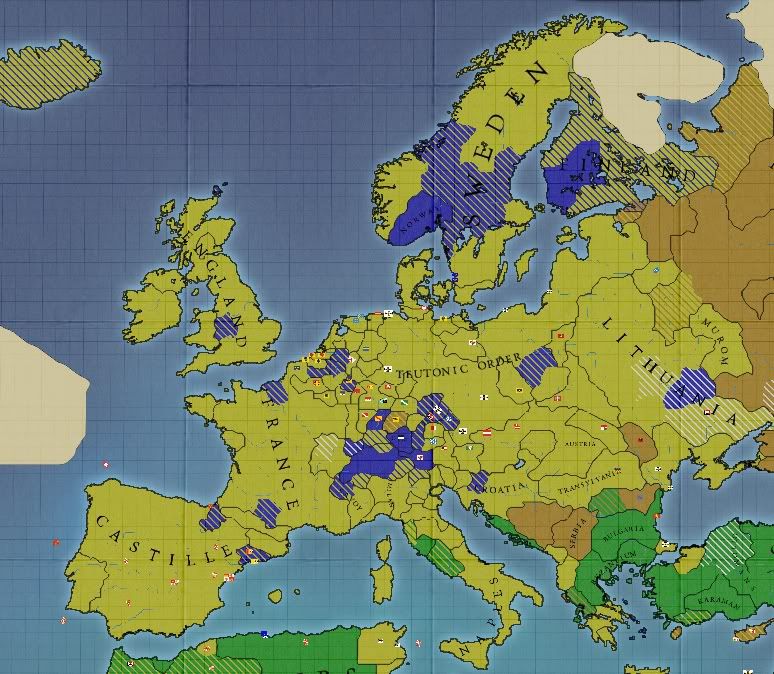
The initial spread of Protestantism was quite limited
Amongst the members of the Order itself, Luther’s teachings were met with scorn. His teachings against the monks and papal authority gathered little popularity amongst those who were the monks and wielded Papal authority. The only area where the monks were sympathetic was on the issue of clerical celibacy. Due to the immense demands of the Ordenstadt and the limited number of men willing to take vows of perpetual chastity, the vast majority of the lower ranks of the administrators and Ritterbruders were composed of “lay brothers” who were not subject to such restrictions. However, the upper echelons of the Order were entirely composed of celibate monks, not all of whom were happy with their status. But this one issue was not enough to make the Order split from Rome. The philosophies promoted by the reformation would severely weaken the Order’s temporal power and possibly unravel the fabric of the Ordenstadt itself. For these reasons the Order stayed true to the Pope and, in part from their experience converting the Muslim peoples of the Holy Land and Ottoman Empire, they kept the vast majority of the Ordenstadt firmly Catholic.
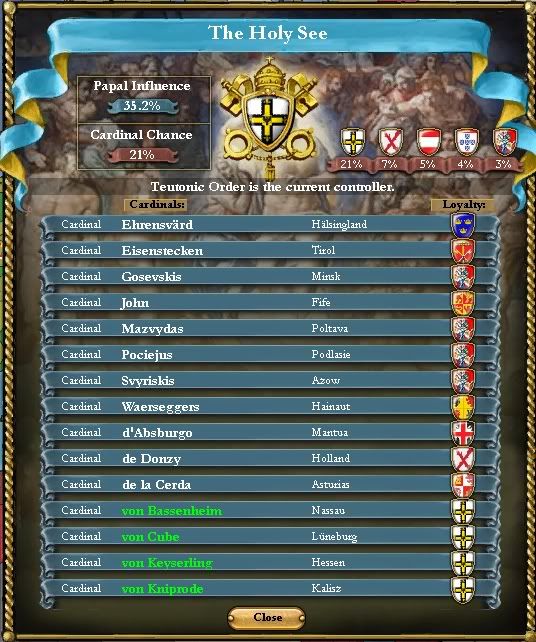
With the Pope firmly under Teutonic influence any reduction in Papal temporal power was firmly opposed by the Order
Gameplay Notes:
- Yup, I’m staying Catholic. It wouldn’t make sense to go Protestant for gameplay or historical reasons. With perpetual control over the papacy giving about -.5 infamy per year staying catholic makes conquest a lot easier and is worth more than the economic benefits of converting. Plus, I doubt that a bunch of fanatical monks who virtually control the Pope and were engaged in massive crusades would ever turn heretic. In my case, this turned out to be the right move, and you’ll see why… in future updates!
- From some cursory research the main causes of the reformation in Germany seem to be ecclesiastic corruption, lack of a central government, Church “taxes” going to Rome instead of the local area, and the restrictions of the Church on the middle class. I doubt that many of these problems would be so widespread in the Order’s theocracy, which is also quite liberal from the high free subjects slider. Luther would probably hate the Ordenstadt – the perfect melding of papal and temporal power.
- Cardinal chances are rather unbalanced. As a large nation getting ~15% papal influence I am dominating the College of Cardinals. The cardinal chance equation really needs to be revised to give everyone else a chance
Rest, Recovery, Growth, and Exploration
The years following the crusade into the holy land were unusually peaceful for the Ordenstadt. After his stupendous struggles with the empire and Islam, Albrecht wanted to give his realm time to recover and flourish. However, these peaceful years were not without major events. The neighboring kingdom of Lithuania was beset with civil war, and eventually degenerated into Lithuania and Ukraine. Meanwhile, Wurttemberg was conquered by the Order through a small show of force. In a diplomatic coup, Albrecht signed a comprehensive treaty of trade and alliance with Muscovy which assigned to Muscovy’s influence all territory East of Pskov and Crimea, to the Order Prussia, Crimea, and all territory West of Ukraine/Lithuania, guaranteed mutual non-involvement in the buffer states of Lithuania and Ukraine, gave favored status to Muscovite trade through the Baltic and Bosporus, and finally pledged perpetual friendship and mutual military assistance in times of war. The factors behind this treaty were quite simple. With the Order controlling the Baltic and the Bosporus, all Russian-European trade had to flow through the Ordenstadt. With the Hochmeister looking towards Europe and the Holy Land and the Tsar busy expanding into Siberia and Kazakhstan a mutually agreeable establishment of spheres of influence and friendly military and diplomatic relationships benefitted both nations. Most importantly, the Teutonic Order now rested at the center of a strong coalition with both Castile in the West and Muscovy in the East. No nation on Earth would prove able to stand before this mighty coalition – while it lasted.
Albrecht’s most important contribution during this time was undoubtedly the establishment of overseas exploration and colonization by the Ordenstadt. Both England and Portugal had been expanding into the Americas and Africa, and Albrecht felt that the Ordenstadt needed to get in on the action. Although ill-placed for exploration, the alliance with Castile gave Teutonic explorers an excellent base for their expeditions. Before long, Teutonic backed expeditions traversed the coasts of North and South America and had reached such exotic destinations as India, China, and Japan. In an effort to gain practical experience at colonization Albrecht financed the colonization of Gruneland as a stepping point to North America. Although the initial colonists faced starvation from the inhospitable climate, the massive amounts of marine life soon established a stable population. With the discovery of large numbers of seals in the northern settlements the colonists obtained a valuable trade good in the form of sealskins. Baby sealskin clothes were especially prized by the nobility of Europe for their luxurious softness and water-repelling properties and soon became the chief source of the colony’s wealth.
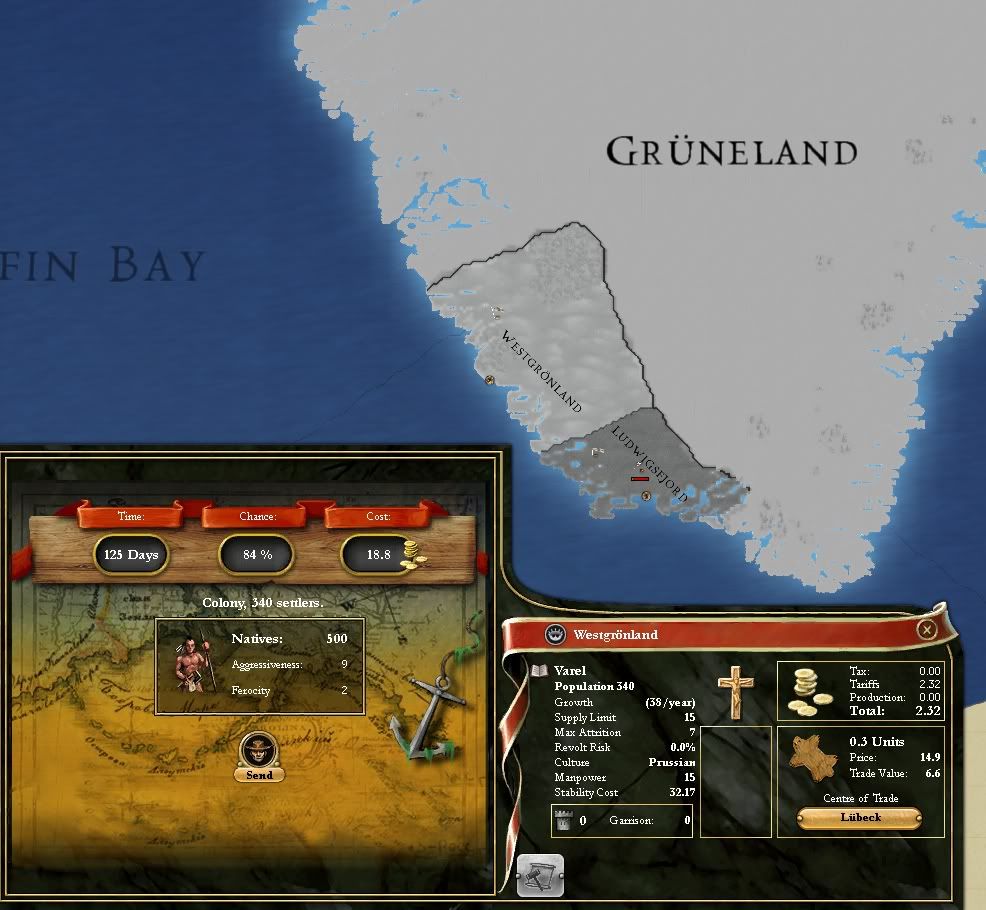
The first Teutonic Colony at Gruneland. Seal furs would be the region's chief export
Upon hearing the reports of the vast wealth in the East, Albrecht was determined to obtain a port to the Indian sea. To achieve this goal and to fully secure the Holy Land, he decided to embark upon a crusade against the Mamluks with the dual purposes of acquiring their Mediterranean coastline and a port in the Red Sea. Preparations were almost complete and the Hochmeister himself had travelled to Judea to lead his armies when tragedy struck. When travelling through the countryside with a small company of riders, Albrecht was attacked by a large band of Muslim raiders. Although they fought valiantly and were eventually victorious, his Ritterbruders were unable to save Albrecht from an arrow. All of Europe mourned the death of the man who reclaimed Jerusalem, and a massive funeral was held at Jerusalem where his tomb still stands today. During the reign of Friedrich Wilhelm II he was canonized by the Pope for his role in returning Christianity to the Holy Land, and his tomb and cathedral are now one of the many holy sites in Jerusalem.
So ended the life of Albrecht II, who is widely considered to be the greatest Hochmeister of the Teutonic Order. His twenty one year reign saw the end of the Holy Roman Empire, the recapture of the Holy Land for Christianity, the exploration of the Americas and Far East, the beginning of the Protestant Reformation, and the formation of the treaties with Castile and Muscovy which would shape European politics over the next century. Albrecht II was clearly one of those rare, great men who had the power, the will and the ability to bend the world to their will.
Gameplay Notes:
- The alliance with Muscovy made me very happy and is a key feature in future policy. I’ve always tried to avoid wars in the East and this makes life much easier! Ukraine/Lithuania are protected by guarantees, but everything else is fair game!
- And the Colonization begins! With Russia off the table we’ve gotta get our Lebesraum somewhere!
- The English are starting to go after Mexico and the South. Castile is surprisingly uninterested in colonization.
Author’s Notes: The exam hell is mostly over… now back to research hell! Hopefully I’ll get a few more updates in over Christmas. Only two more until we catch up with my progress in the game itself!



